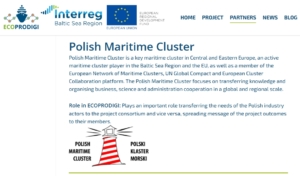
ECOPRODIGI project – eco-efficiency to maritime industry processes in the Baltic Sea Region through digitalisation.


ECOPRODIGI project (2017-2020), funded by the Interreg Baltic Sea Region Programme, was created to bring eco-efficiency to maritime industry processes in the Baltic Sea Region through digitalisation. As stated in the application, the project partnership aimed to do its share in helping Baltic Sea Region (BSR) to become a frontrunner ‘in maritime industry digitalisation and clean shipping’.
The launch of the project initiative had three motivations. The Baltic Sea is heavily impacted by active sea transport, which produces emissions to the environment. Regulations have been imposed, and new ones will emerge to reduce emissions. Therefore, new solutions are needed to make shipping more eco-efficient and sustainable. Second, the maritime industry in the Baltic Sea Region (BSR) is faced by global competition and requires cost-cutting. Additionally, customers are increasingly asking for more sustainable services. Developing more eco-efficient processes and digital technologies provides a solution to these needs. Third, digital transformation offers a wide collection of solutions to make maritime processes more eco-efficient. Thus, all three of these factors motivated a group of BSR actors to take a step forward in the digitalisation journey.
Maritime industry processes in the Baltic Sea Region – Synthesis of eco-inefficiencies and the potential of digital technologies for solving them
Report by: Elisa Aro (University of Turku), Niels Gorm Malý Rytter (Aalborg University) and Teemu Itälinna (University of Turku)
This synthesis was developed under ECOPRODIGI’s Work Package 2 ‘Evaluating maritime industry processes and technology outlook’. It offers an overview of
the results achieved so far in the project’s three technology cases: digital performance monitoring, optimising cargo stowage and optimising shipyard processes. The report summarises the eco-inefficiencies identified in the processes of the involved end-users, and it introduces the digital technologies that are currently in use and the most promising digital technologies and concepts for improving eco-efficiency. The report also addresses challenges and requirements that the implementation of new technologies and concepts involves. On that basis, the report provides an outlook for the future in regard to capitalising the benefits of digitalisation. The focus is on the Baltic Sea region, but the scope is global, as the solutions may be utilised anywhere.
Download the report (pdf) HERE.
